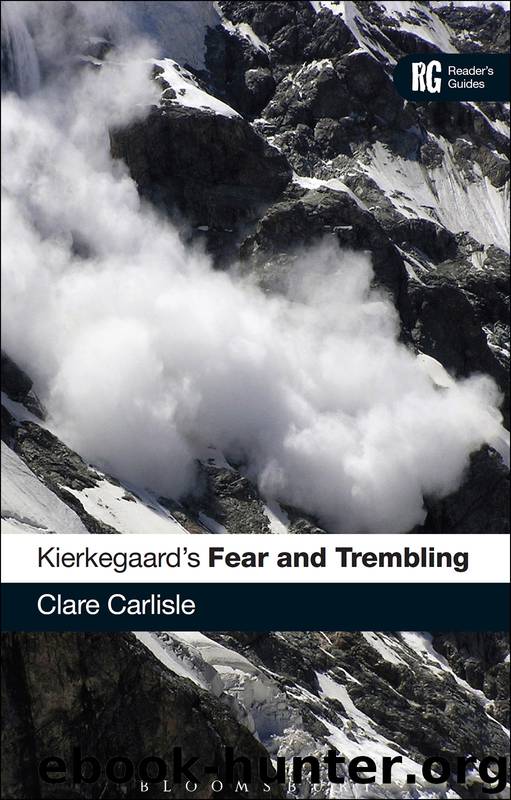Kierkegaard's Fear and Trembling by Carlisle Clare

Author:Carlisle, Clare
Language: eng
Format: epub
Publisher: Bloomsbury UK
Published: 2014-03-02T16:00:00+00:00
From a Christian point of view
In Problem I, Johannes de silentio is not only considering the ethical significance of the story of Abraham in its original context, but is also trying to draw out its implications from a more modern point of view. The question is not just whether Abraham’s willingness to kill Isaac was ethically reprehensible in its own time, but whether it is ethically reprehensible to a nineteenth-century Christian – and, indeed, whether it is reprehensible now. The question about a teleological suspension of the ethical for the sake of an individual’s personal relation to God concerns the Sittlichkeit of modern northern European society, not the Sittlichkeit of an ancient Hebrew tribe, for today child sacrifice is regarded as murder. And this seems to be borne out by the fact that in his ‘Preliminary Outpouring from the Heart’ Johannes de silentio considers the story of Abraham from the perspective of a nineteenth-century preacher and his congregation, and describes a contemporary knight of faith whose inward movements are the same as those of Abraham.
Throughout Problem I there are hints that Johannes de silentio is considering the story of Abraham from a specifically Christian point of view, and this becomes more explicit at the end of the section. Abraham is renowned in the Christian tradition as the father of faith, and faith is at the heart of the Christian life. Johannes de silentio’s contention that faith is a paradox that involves a teleological suspension of the ethical applies to a Christian’s belief in God as much as to Abraham’s, and indeed it is primarily Christian faith that is being brought into question in Fear and Trembling, since the envisaged reader is someone who assumes herself to be a Christian and to understand the nature of her faith.
Johannes de silentio’s interest in the Christian significance of Abraham’s situation is hinted at in the third paragraph of Problem I, where he suggests that the categories of Greek philosophy cannot allow us to admire Abraham:
if the ethical, i.e. the ethical life, is the highest and nothing incommensurable remains in a human being in any way other than that incommensurability constituting evil, i.e. the particular that must be expressed in the universal, then one needs no other categories than what the Greek philosophers had or what can be deduced from them. [47–8]
This remark is immediately followed by a reference to the contrast, often discussed among his nineteenth-century contemporaries, between the pagan world and the Christian world: ‘it is all right to say that paganism did not have faith, but if something is supposed to have been said by that, then one must be a little clearer about what one understands by faith’ [48]. This makes it clear that the pseudonym is concerned with Christian faith, and when in the next paragraph he describes faith as the paradox by which the individual becomes higher than the universal, the reader will naturally understand this as a comment about Christianity. Having elaborated this account of faith by
Download
This site does not store any files on its server. We only index and link to content provided by other sites. Please contact the content providers to delete copyright contents if any and email us, we'll remove relevant links or contents immediately.
The Lost Art of Listening by Michael P. Nichols(7488)
Why I Am Not A Calvinist by Dr. Peter S. Ruckman(4148)
The Rosicrucians by Christopher McIntosh(3509)
Wicca: a guide for the solitary practitioner by Scott Cunningham(3166)
Signature in the Cell: DNA and the Evidence for Intelligent Design by Stephen C. Meyer(3125)
Real Sex by Lauren F. Winner(3013)
The Holy Spirit by Billy Graham(2943)
To Light a Sacred Flame by Silver RavenWolf(2813)
The End of Faith by Sam Harris(2733)
The Gnostic Gospels by Pagels Elaine(2527)
Waking Up by Sam Harris(2454)
Nine Parts of Desire by Geraldine Brooks(2358)
Jesus by Paul Johnson(2352)
Devil, The by Almond Philip C(2324)
The God delusion by Richard Dawkins(2305)
Heavens on Earth by Michael Shermer(2278)
Kundalini by Gopi Krishna(2180)
Chosen by God by R. C. Sproul(2160)
The Nature of Consciousness by Rupert Spira(2095)
